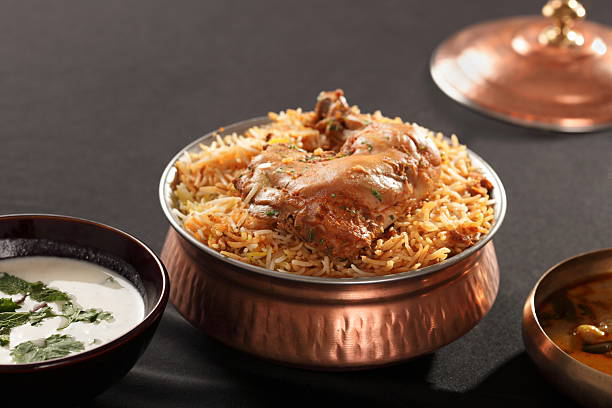How many calories in biryani mutton or chicken?
A general idea of the calories in biryani count for chicken and mutton biryani based on a typical serving (approximately 1 cup or ~250-300g):
Calories in Chicken Biryani (per 1 serving of ~300g):
Basmati rice (150g): ~540 kcal
Chicken (100g): ~200 kcal
Oil/Ghee (15g): ~135 kcal
Yogurt and other ingredients (onions, tomatoes, spices): ~50-100 kcal
Total per serving: ~900-1000 kcal
Calories in Mutton Biryani (per 1 serving of ~300g):
Basmati rice (150g): ~540 kcal
Mutton (100g): ~300 kcal
Oil/Ghee (15g): ~135 kcal
Yogurt and other ingredients (onions, tomatoes, spices): ~50-100 kcal
Total per serving: ~1000-1100 kcal
Approximate breakdown per 100g:
Calories in Chicken biryani: ~300-350 kcal
Calories in Mutton biryani: ~330-370 kcal
The calorie count will vary based on how much oil or ghee is used and the specific ingredients.
What benifit calories in biryani mutton or chicken?
The calories in mutton or chicken biryani provide energy and essential nutrients, but the overall benefits depend on the quality of the ingredients and how it's prepared. Let us break down the benefits of the calories and nutrients in both mutton and calories in chicken biryani:
1. Protein Content calories in
Chicken biryani: Chicken is a lean source of protein, which is essential for muscle growth, tissue repair, and immune function. It provides about 20-25g of protein per 100g of chicken.
Calories in Mutton biryani: Mutton is a richer source of protein and also contains more fat. It helps with muscle development and is packed with iron and zinc. Mutton provides about 18-20g of protein per 100g, but higher in calories due to its fat content.
Benefit: Protein keeps you feeling full, promotes muscle repair, and supports a healthy metabolism.
2. Healthy Fats
Ghee or oil: Biryani often uses ghee or oil, which provides healthy fats that help absorb fat-soluble vitamins (A, D, E, K) and provide energy. However, excess fat from ghee or oil can increase calorie intake.
Benefit: Healthy fats support brain function, provide long-lasting energy, and promote satiety.
3. Carbohydrates
Basmati rice: The rice in biryani is rich in carbohydrates, providing immediate energy for your body. Basmati rice has a lower glycemic index compared to other types of rice, meaning it causes a slower rise in blood sugar.
Benefit: Carbohydrates fuel your body, especially for physical and mental activities.
4. Vitamins and Minerals
Mutton: Rich in iron, zinc, and B vitamins (especially B12). Iron helps in the formation of red blood cells, while zinc supports the immune system.
Chicken: Contains B vitamins, particularly B6 and B3 (niacin), which are important for metabolism and brain function.
Benefit: These vitamins and minerals are crucial for energy production, immunity, and maintaining healthy skin and nerves.
5. Spices and Herbs
Biryani is typically rich in spices like turmeric, cumin, coriander, and cardamom. These have anti-inflammatory and antioxidant properties, which can promote heart health, improve digestion, and reduce inflammation.
Benefit: The spices used in biryani can support digestion, reduce bloating, and contribute to overall health by reducing oxidative stress.
6. Iron and Zinc
Mutton: Provides more iron and zinc than chicken. Iron helps prevent anemia, and zinc is vital for immune function and healing wounds.
Benefit: Mutton calories in biryani can be particularly beneficial for those needing more iron (individuals with anemia).
Things to Keep in Mind:
Moderation is key: Although biryani provides beneficial nutrients, it is calorie-dense, especially due to the use of oil/ghee and rice.
Balance with veggies: Adding vegetables like peas, carrots, or spinach can boost fiber and nutrient content.
Portion control: A large portion can provide too many calories, which may contribute to weight gain if not balanced with physical activity.
both mutton and chicken biryani can offer benefits in terms of protein, energy, and essential vitamins/minerals, but should be enjoyed in moderation to maintain a balanced diet.
How many calories in biryani mutton or chicken?
A general idea of the calorie count for chicken and mutton calories in biryani based on a typical serving (approximately 1 cup or ~250-300g):
Chicken Biryani (per 1 serving of ~300g):
- Basmati rice (150g): ~540 kcal
- Chicken (100g): ~200 kcal
- Oil/Ghee (15g): ~135 kcal
- Yogurt and other ingredients (onions, tomatoes, spices): ~50-100 kcal
Total per serving: ~900-1000 kcal
Mutton Biryani (per 1 serving of ~300g):
- Basmati rice (150g): ~540 kcal
- Mutton (100g): ~300 kcal
- Oil/Ghee (15g): ~135 kcal
- Yogurt and other ingredients (onions, tomatoes, spices): ~50-100 kcal
Total per serving: ~1000-1100 kcal
Approximate breakdown per 100g:
- Chicken biryani: ~300-350 kcal no
- Mutton biryani: ~330-370 kcal
The calories in biryani count will vary based on how much oil or ghee is used and the specific ingredients.
How much members cooking calories in biryani per 1kg?
The calories in biryani content of biryani depends on the ingredients used, such as the type and amount of rice, oil or ghee, meat (chicken, mutton, etc.), and other additions like yogurt, nuts, or cream. an approximate breakdown for chicken calories in biryani per 1 kg:
Components (per 1 kg of chicken biryani):
- Basmati rice (500g): ~1800 kcal
- Chicken (500g): ~1100-1200 kcal
- Oil/Ghee (100g): ~900 kcal
- Yogurt (100g): ~60-100 kcal
- Spices, onions, tomatoes, etc.: ~150-200 kcal (depending on quantities)
Total:
- For 1 kg of calories in chicken biryani, the total calories can range from 4000 to 4300 kcal.
Per serving:
- If divided into approximately 6-8 servings, each serving would have about 500-700 kcal.
For other variations like mutton, vegetarian, or lower-calories in biryani (using less oil or basmati rice), the calorie count will vary. Would you like a detailed breakdown for a different version of biryani?
Tags
cooking





